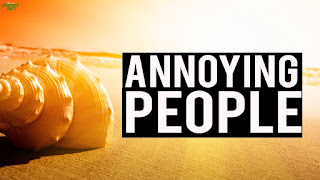(image: youtube.com)
Uman jaon may tawo na di ta ganahan? In reality, persons who are
acting against our values are most of the time repelled by us. When our own
definitions of moral issues would be disturbed, we raise our eyebrows and have
this repulsion towards the culprit.
Our negative feelings toward someone get stronger as bad experiences with them pile up, and these negative thoughts trigger the fight-or-flight response in our bodies. As AJ Marsden, assistant professor of Psychology at Beacon College in Leesburg, Florida, puts it, “our fight-or-flight response is our body’s way of dealing with a stressor.”
People do not pursue close relationships indiscriminately — they probably look for people who are likely to reciprocate their investments. So when perceivers detect that someone is hiding their emotions, they may interpret that as a disinterest in the things that emotional expression facilitates — closeness, social support, and interpersonal coordination (Lebowitz, 2019).
That is why honesty and being natural is one of the reasons why we like others. But those who create stories behind our backs, those who are envious and perform character-assassinations to accommodate their selfish intentions are being disliked.
Most disliked people usually tend to have no social IQ. They say things like “well at least I’m being honest” or “this is how I am, deal with it”. They don’t know how to treat other people and tend to be arrogant, for no apparent reasons most of the time. Nobody likes a big mouth, a show off, a humble boaster, or people who don’t know how to just say thank you when given a compliment.
According to Kayiba Mpoyi, these traits are unbecoming and are not what true class acts are made of. Being nice and polite to people you like is easy, being nice and polite to someone you cannot tolerate or who you are in constant disagreement with – that is character. Learning how to speak to people is a skill only few have mastered.
No one likes dealing with a difficult person. Life would be so much easier if we could just avoid all the people we dislike. But, as they say, life happens. You might have to work on a project with a vexing colleague. Or the disliked person keeps showing up to professional mixers and social functions. Worst of all, you might find out your most irksome acquaintance is being tagged-along by a friend of yours.
But then all tables will be turned when others are the ones NOT to like you. Since you have the capacity of not liking others, same thing will also happen to you. It is one thing to say that you don’t care what people think about you but it’s another thing to say you don’t care if anyone likes you because everybody wants to be liked by someone.
People who are likable are genuine and they genuinely like other people.
Ron Sherbert (2020) posited these things as the core things that make people likable: They are good listeners; they engage others in conversation by asking open-ended questions; they are positive and enthusiastic; they are natural and; they do not judge others.
A study released by the US Department of Labor concluded that 46 percent of those who quit their jobs did so because they felt not listened to and were therefore unappreciated. Consider this: almost half the people will leave their friends because they didn’t feel like their pals were listening.
The measure of self-assurance is how deeply and sincerely interested you are in others; the measure of insecurity is how much you try to impress them with you.
Research shows that likable people always live a happier and more fulfilled life than those who are unlikable.
It is in this mindset that we struggle to be contributors of happy moments with others than being disliked by them for bringing negative encounters which they do not want to experience once again.


No comments:
Post a Comment